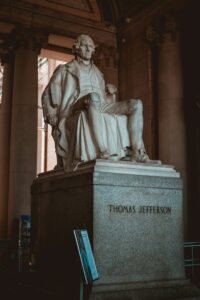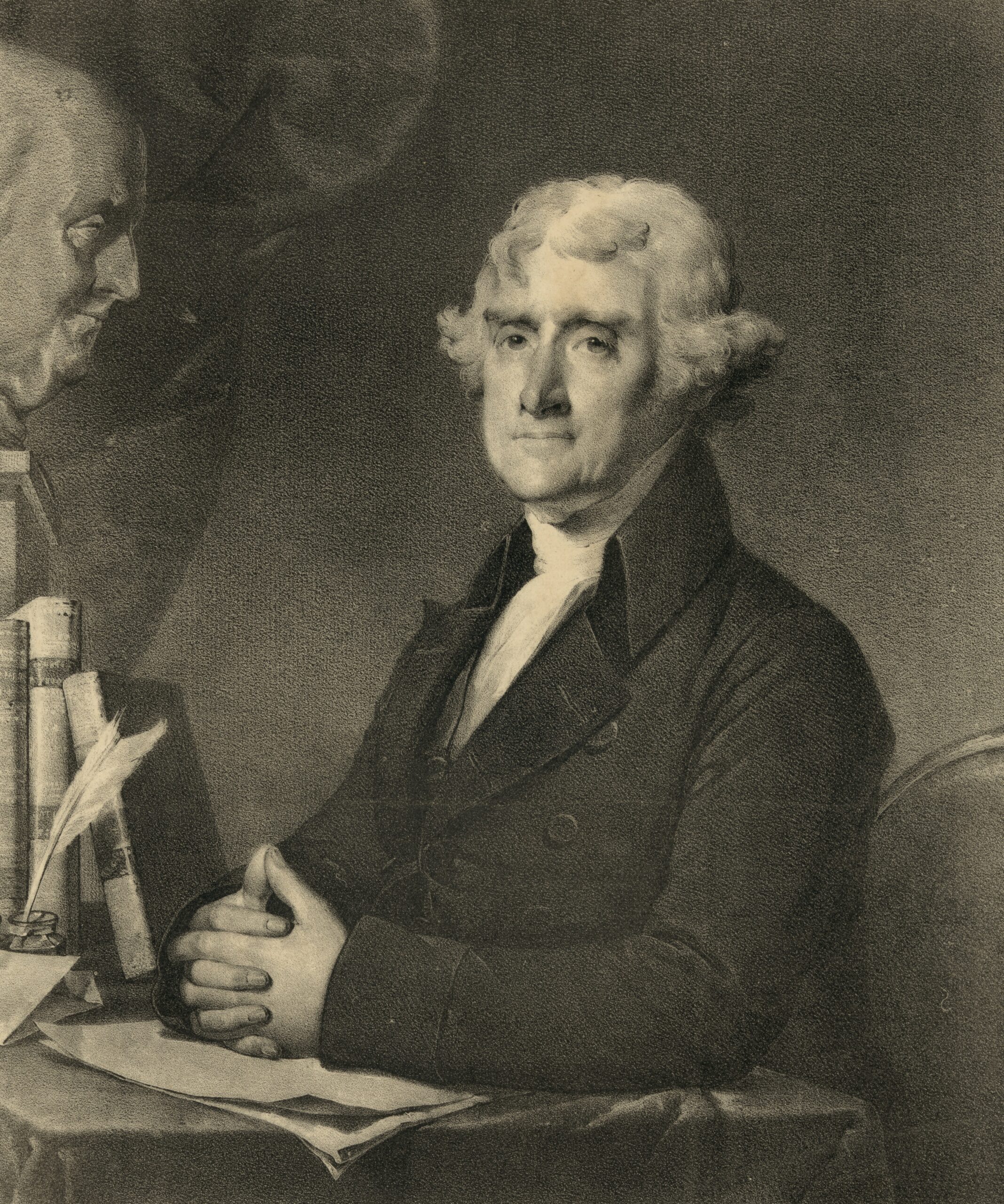Thomas Jefferson’s life is a fascinating journey through the early years of the United States. Let’s explore his life year by year:
1743:
Thomas Jefferson was born on April 13th in Shadwell plantation in British colony of Virginia, to Peter Jefferson, a surveyor and planter, and Jane Randolph, a member of one of Virginia’s most distinguished families (first cousin of William Randolph). He was third of ten children of them. His birth marked the beginning of a remarkable life that would shape the course of American history.
1745:
Peter Jefferson moved to Tuckahoe Plantation with his family.
1748:
Thomas Jefferson studied in an English school at age five.
1752:
Jefferson attended a local school run by a Scottish Presbyterian minister. At this time he began studying Latin, Greek, and French. He also learned to ride horses. Thomas also read books from his father’s library.
1753:
Jefferson returned to Shadwell.
1757:
Peter Jefferson died. His estate divided between his two sons survived in infancy, Thomas and Randolph. John Harvie Sr became their guardian.
1758:
Jefferson was taught by the Reverend James Maury near Gordonsville, Virginia.
1761:
Jefferson began attending the College of William and Mary in Williamsburg, Virginia, where he studied mathematics, metaphysics, and philosophy. His time at college laid the foundation for his future intellectual pursuits.
1762:
Jefferson studied the law under Wythe’s tutelage and worked as a law clerk in his office.
1767:
Jefferson was admitted to the Virginia bar and began practicing law in Albemarle County. His legal career would provide him with valuable experience and connections that would later serve him well in his political endeavours.
1772:
Jefferson married Martha Wayles Skelton( his third cousin), a wealthy widow of Bathurst Skelton. , on January 1st. Their marriage would be a happy one. They have six children: Martha “Patsy” (1772–1836); Jane (1774–1775); an unnamed son who lived for only a few weeks in 1777; Mary “Polly” (1778–1804); Lucy Elizabeth (1780–1781); and another Lucy Elizabeth (1782–1784).[57][e] Only Martha and Mary survived to adulthood.
1773:
Martha’s father John Wayles died. Jefferson and Martha inherited 135 slaves, 11,000 acres and the estate’s debts.
1774:
Jefferson’s political career began to take shape as he was elected to the Virginia House of Burgesses, where he quickly emerged as a leading voice for colonial rights and independence from British rule.
1776:
A pivotal year in Jefferson’s life, he authored the Declaration of Independence, which was adopted by the Continental Congress on July 4th. The Declaration would become one of the most important documents in American history, articulating the principles of freedom, equality, and self-governance.
1779:
Jefferson was elected Governor of Virginia, a position he held during a tumultuous time in the Revolutionary War. Despite facing challenges and criticism, he worked tirelessly to defend Virginia from British invasion and uphold the ideals of the revolution.
1782:
Martha Wayles Skelton died few months after the birth of her last child, leaving Jefferson heartbroken.
1783:
After serving as Governor, Jefferson retired to his estate, Monticello, where he focused on agricultural pursuits and began drafting plans for the University of Virginia, which he would later establish.
Jefferson was appointed a Virginia delegate to the Congress of the Confederation organized following the peace treaty with Britain.
1784:
Jefferson was appointed Minister to France, where he would spend the next several years immersed in European culture and politics. His time in France would have a profound influence on his worldview and his vision for the future of America.
1786:
Jefferson met and fell in love with Maria Cosway, an Italian-English painter, musician, and educator. They maintained a lifelong correspondence.
1789:
Jefferson returned to the United States and was appointed Secretary of State by President George Washington. In this role, he played a key role in shaping American foreign policy and defending the interests of the new nation on the world stage.
1790:
Jefferson became 1st secretory of states of United States.
1793:
Jefferson supported France against Britain when the two nations fought.
1796:
Jefferson lost the Electoral College vote John Adams and was thus elected vice president.
1797:
In March 4, Jefferson became the 2nd vice-president of United States. President was John Adams.
1801:
Jefferson was elected as the third President of the United States, defeating the incumbent, John Adams, in a bitterly contested election. His presidency would be characterized by his commitment to limited government, individual liberty, and territorial expansion.
1803:
One of the most significant events of Jefferson’s presidency was the Louisiana Purchase, in which the United States acquired vast territories from France, doubling the size of the young nation and securing its future as a continental power.
1805:
Jefferson re-elected as President.
1809:
After serving two terms as President, Jefferson retired to Monticello, where he continued to be active in public life, advocating for causes such as education, religious freedom, and the abolition of slavery.
1811:
Jefferson publishes his book “Notes on the State of Virginia,” a comprehensive study of the geography, economy, and culture of Virginia. He also continues to correspond with fellow intellectuals and politicians, including John Adams.
1812:
War breaks out between the United States and Britain. Despite his opposition to war, Jefferson supports the American cause and advocates for a strong defence.
1815:
The War of 1812 comes to an end with the signing of the Treaty of Ghent. Jefferson focuses on rebuilding the nation and promoting national unity.
1816:
Jefferson helps establish the University of Virginia, one of his most significant contributions to education and intellectual life in America.
1817:
The University of Virginia opens its doors, with Jefferson serving as its first rector. He plays an active role in shaping the curriculum and policies of the university.
1826:
Thomas Jefferson passed away on July 4th, the 50th anniversary of the adoption of the Declaration of Independence. His death marked the end of an era but his legacy would live on, inspiring future generations of Americans to strive for liberty and equality for all.


